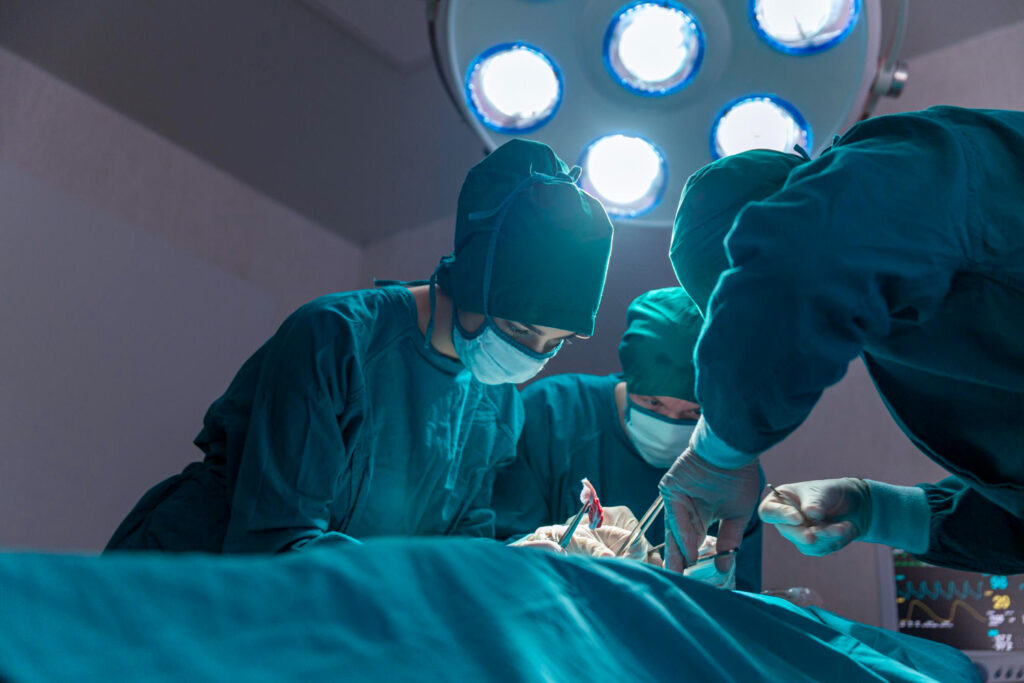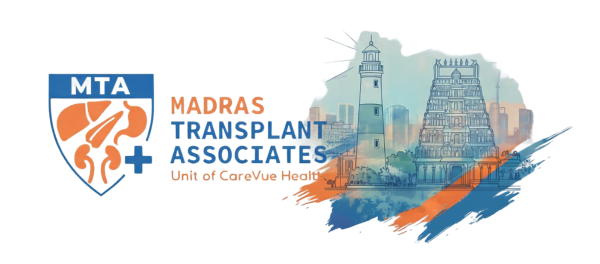Liver Transplantation
Madras Transplant Associates, Unit of CareVue Health, is a pioneering multi-dimensional healthcare establishment specializing in advanced transplantation, cellular medicine, and transplant oncology. Liver transplantation (LT) is one of our core specialties, combining cutting-edge surgical expertise, advanced organ preservation, and comprehensive patient care.

Introduction
Liver transplantation (LT) is a life-saving surgical procedure in which a diseased or failing liver is replaced with a healthy donor liver. Initially developed for end-stage liver disease, LT is now also performed for certain liver cancers and complex metabolic conditions. Madras Transplant Associates’s LT program integrates surgical precision, oncology expertise, and personalized immunosuppression protocols.
Indications
- A. Chronic Liver Diseases
- Cirrhosis due to viral hepatitis (Hepatitis B, C)
- Alcohol-related liver disease
- Non-alcoholic steatohepatitis (NASH)
- Autoimmune hepatitis
- Metabolic diseases such as Wilson’s disease and hemochromatosis
- B. Acute Liver Failure
- Fulminant hepatic failure from viral hepatitis, drug toxicity, or autoimmune causes
- C. Liver Tumors
- Hepatocellular carcinoma (within or outside of selection criteria)
- Selected cases of cholangiocarcinoma, hepatoblastoma, and rare tumors
- D. Other Indications
- Budd–Chiari syndrome
- Polycystic liver disease
- Certain pediatric metabolic disorders
Donor Types
- Deceased Donor Liver Transplantation (DDLT): Whole liver from brain-dead or occasionally cardiac-death donors.
- Living Donor Liver Transplantation (LDLT): Partial liver donated by a healthy individual; Madras Transplant Associates specializes in complex right lobe and left lateral segment donations
- Split Liver Transplantation: One donor liver used for two recipients, often an adult and a child.
Transplant Process
- Evaluation: Comprehensive assessment by Madras Transplant Associates’s multidisciplinary transplant team, including hepatologists, surgeons, oncologists, cardiologists, and psychologists.
- Listing: Patients are prioritized using urgency, and compatibility.
- Surgery: Removal of diseased liver, implantation of donor liver, and vascular/biliary reconstruction.
- Postoperative Care: ICU monitoring, immunosuppression, infection prevention, and long-term follow-up.
Outcomes
- At Madras Transplant Associates, liver transplantation outcomes meet or exceed international benchmarks:
- 1-year survival: 85–90%
- 5-year survival: 70–75%
- Patients experience significant quality-of-life improvements, with the majority returning to normal daily activities.
Innovations at Madras Transplant Associates
- Normothermic Machine Perfusion to optimize donor liver quality and extend preservation time.
- Precision immunosuppression with mTOR inhibitor protocols in cancer-related cases.
- Integration with interventional radiology for bridging and downstaging.
- Minimally invasive donor hepatectomy techniques.
- AI-driven recipient-donor matching systems.
Future Directions
- Expansion of transplant oncology indications using advanced tumor biology profiling.
- Regenerative medicine approaches, including bioengineered liver grafts.
- Broader use of organ preservation technologies.
- Participation in global multicenter clinical trials.
Liver Transplantation for Tumors
Madras Transplant Associates is a multi-dimensional leader in transplantation, cellular medicine, and transplant oncology. Liver transplantation (LT) has traditionally been a life-saving option for patients with end-stage liver disease, and is now an established or emerging treatment for certain hepatic and select extrahepatic malignancies.

Why Liver Transplant for Tumors?
Liver transplantation addresses two challenges simultaneously: removal of the tumor-bearing liver and replacement of the diseased liver with a healthy donor organ. In select cases, LT offers superior survival compared to resection or palliative therapy.
Indications in Tumor Transplantation
- Madras Transplant Associates provides transplantation for the following tumor indications:
- Hepatocellular Carcinoma (HCC): Milan criteria and expanded protocols.
- Perihilar Cholangiocarcinoma: Following Mayo Clinic neoadjuvant protocol.
- Hepatic Epithelioid Hemangioendothelioma.
- Pediatric Hepatoblastoma.
- Emerging Indications: Colorectal Liver Metastases (CRLM) and Neuroendocrine Liver Metastases.
Patient Selection Principles
- Patient selection is critical for successful outcomes in tumor-related LT. Key principles include:
- Assessment of tumor burden and biology.
- Absence of extrahepatic spread.
- Potential for downstaging with locoregional therapies.
- Multidisciplinary tumor board review at MTA.
Madras Transplant Associates’s Competitive Edge
- Normothermic organ perfusion expands the donor pool and improves graft quality.
- Integration with oncology, interventional radiology, and cellular therapy.
- Precision immunosuppression strategies using mTOR inhibitors.
- Established a living donor program to reduce waitlist dropout rates.
Downstaging & Bridging Therapies
Madras Transplant Associates employs advanced therapies such as radiofrequency ablation (RFA), Y-90 radioembolization, and external beam radiotherapy to downstage tumors and bridge patients to transplant.
Outcomes & Global Benchmarks
- Madras Transplant Associates aims for survival outcomes that meet or exceed global benchmarks:
- HCC within Milan criteria: >70% 5-year survival, <15% recurrence.
- Perihilar cholangiocarcinoma (Mayo protocol): ~65% 5-year survival.
- Hepatic epithelioid hemangioendothelioma: >80% long-term survival.
- CRLM (experimental): ~60% 5-year survival in select patients.
Case Spotlight
Example: A 39-year-old female with HCC beyond Milan criteria underwent successful downstaging with Y-90 therapy, followed by LDLT using a right lobe graft. Post-transplant, the patient remains disease-free at 2 years with excellent graft function.
Care Pathway
Referral → Comprehensive Evaluation → Tumor Board Review → Listing → Downstaging (if required) → Transplant → Recovery → Long-term Surveillance with oncology and transplant teams.
Future Directions
- Madras Transplant Associates is committed to advancing transplant oncology through:
- AI-driven tumor biology prediction.
- Expanded use of organ preservation technology.
- Integration into global clinical trials for novel oncologic indications.

